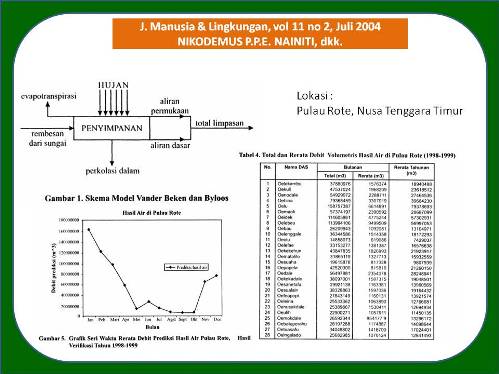
PREDIKSI SUMBERDAYA AIR DI PULAU KECIL: STUDI KASUS DI PULAU ROTE NUSA TENGGARA TIMUR (Prediction of Water Resources in Small Island: Case Study in Rote Island of East Nusa Tenggara Province, Indonesia)
Nikodemus P.P.E. Nainiti(1*), Sahid Susanto(2), Putu Sudira(3)
(1) Program Studi Teknik Pertanian Program Pascasarjana Universitas Gadjah Mada
(2) Fakultas Teknologi Pertanian Universitas Gadjah Mada, Yogyakarta
(3) Fakultas Teknologi Pertanian Universitas Gadjah Mada, Yogyakarta
(*) Corresponding Author
Abstract
ABSTRAK
Studi ini bertujuan untuk memprediksikan ketersediaan air di pulau Rote yang kering di Nusa Tenggara Timur. Penelitian ini menggunakan model hidrologi yang dikembangkan oleh Vanden Beken and Byloos. Data yang digunakan adalah data hidrologi bulanan selama 6 tahun. Dalam model ini dikaji 5 parameter yakni (1) jenis vegetasi, (2) kondisi tanah, (3) koefisien permukaan. (4) perkolasi, dan (5) aliran air. Penelitian ini menemukan bahwa ketersediaan air sangat tinggi pada musim hujan, yaitu dari Desember sampai Maret. sementara itu ketersediaan air sangat sedikit pada musim kering yakni pada bulan April sampai Oktober.
ABSTRACT
This study aims at predicting water resources availability in the small island having dry climate especially in Rote Island of East Nusa Tenggara Province. The study applied the hydrologic model of Vanden Beken and Byloos. The hydrologic data used for analyzing were monthly data for the period of six years. The parameters in the model include a1 (influenced by kinds of vegetation and soil characteristic), a2 (influenced by soil coarseness), a3 (coefficient of runoff), a4 (influenced by percolation), a5 (seepage to the river). The parameters obtained were correlated to characteristics of ungagged watersheds to find out the volume of water of those watersheds. The statistical and graphical analysis for verification of the model indicated that the period of wet months are December to March, where water resources availability is very high, meanwhile is very low during the dry months (April-October).
Full Text:
ARTIKEL LENGKAP (PDF) (Bahasa Indonesia)Article Metrics
Refbacks
- There are currently no refbacks.
Copyright (c) 2017 Jurnal Manusia dan Lingkungan







